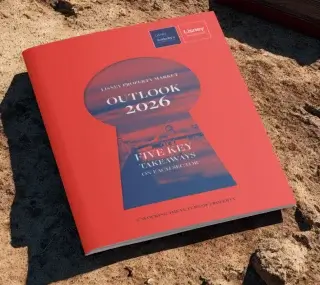read also
 Mortgage Approvals in Ireland Slump Sharply in January
Mortgage Approvals in Ireland Slump Sharply in January
 Lisney Property Market Outlook: Irish Property Market Poised for Steady Growth in 2026
Lisney Property Market Outlook: Irish Property Market Poised for Steady Growth in 2026
 Inflation in Romania Slows to 9.6% but Remains Above Forecast
Inflation in Romania Slows to 9.6% but Remains Above Forecast
 Riots in Mexico Disrupt Air Links to Resort Destinations
Riots in Mexico Disrupt Air Links to Resort Destinations
 UK House Prices Stabilise After 2025 Slowdown
UK House Prices Stabilise After 2025 Slowdown
 Israel Housing Market Eyes a Reset in 2026
Israel Housing Market Eyes a Reset in 2026
Hotel Investment 2025: New Opportunities for the Market — Key Insights from the Cayuga Conference

At the annual Cayuga Conference, industry experts presented an in-depth analysis of investment and development trends — and the overall tone proved far more restrained than in previous years.
Against the backdrop of slowed development and increasingly tight financial conditions, Cayuga Conference speakers pointed out a crucial detail: the hotel sector is not shrinking — it is adapting. And within this adaptive transition, several new positive trends are emerging, forming the foundation for the next growth cycle.
First, demand is strengthening for projects with high operational efficiency. Extended stay hotels, lifestyle properties, and low-operating-overhead formats are demonstrating resilience, with RevPAR not only holding steady but showing growth in several regions. This indicates that the market continues to search for — and find — sustainable business models, while investors retain interest in segments where profitability remains above the industry average.
Second, major brands and global hotel chains are strengthening their positions, creating standardized, predictable, and investment-attractive products.
At the same time, demand for renovations and targeted redevelopment projects continues to grow, and investors are increasingly drawn to alternative concepts — from office-to-hotel conversions to expansion within the mid-scale extended stay segment.
The conference made one conclusion clear: the hotel industry is entering a new phase — more complex, costlier, and requiring far deeper professional expertise.
Current Market Conditions: Margin Pressure
According to industry analysts, RevPAR in 2025 is expected to grow only 1.5–2%. This means declining profitability and stricter requirements for operators and developers.
Speakers emphasized that the sector is operating under high uncertainty, and proactive — not reactive — management will be the main determinant of survival.
[h2]Which Projects Are Still Moving Forward


